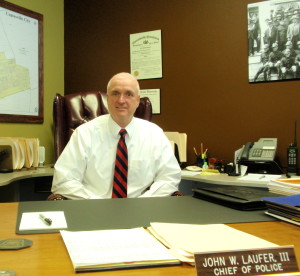Coatesville’s new leader eager to make positive changes
By Kathleen Brady Shea, Managing Editor, The Times
He’s slashed two hours a day from his commuting time, found a worthy cause for his wood-working skills, and enjoyed a warm reception from the hundreds of people he’s met in the past month. But those benefits are secondary ones for Coatesville Police Chief Jack Laufer.
“I am entirely at peace with my decision to come here,” said Laufer during a recent interview. “Every day has been a challenge – but a welcome one.”
The decorated 51-year-old state police veteran explained that he felt ready to leave the state police after more than 26 years, but not ready to retire. “I wanted to go someplace where I thought I could make a positive contribution,” he said.
Few would argue that Coatesville, a city of about 13,100 residents, needed someone with that mindset. Laufer inherited a department with widely-publicized upheaval. In addition to skeletal staffing, sex scandals, evidence-tampering allegations, multiple lawsuits – and the low morale they all engendered – the department had been without permanent leadership since last May when former Chief Julius M. Canale took early retirement.

Coatesville Police Chief Jack Laufer combined his interests in state-police history and wood-working to create a home for a collection that includes a state-police vehicle model for each of the 50 states.
Two of Laufer’s primary objectives- “breathing new life” into both the hiring and the promotions procedures – are already in progress, he said. Although City Council approved the addition of part-timers to the Police Department in June as a way to improve staffing without crippling the city’s strapped coffers, the process had stalled.
Laufer said the department received 183 applications, which have been winnowed to 23. Interviews will begin next week, he said, adding that he hopes to add 10 to 12 part-time officers to the roster. He said he has had discussions with several neighboring chiefs who spoke highly of their part-timers and said they could not run their departments without them.
One of the drawbacks of part-time workers is that they often maintain full-time jobs elsewhere and may not be available when needed, Laufer said. He said having about a dozen would create a pool of resources and minimize that potential downside.
His second priority: getting a command structure in place. He said the tests for promotion to corporal, sergeant and lieutenant are scheduled for mid-April. Right now, the department has no lieutenant, a key second-in-command position, and is short one corporal. He said a department Coatesville’s size should have five; Coatesville has four.
Officers who pass the written test will then be scheduled for interviews with a panel of neighboring police chiefs, Laufer said, adding that he hopes to have the promotions and the part-timers finalized by summer.
In the meantime, Laufer said he has been too busy, mainly with meetings and introductions, to establish a routine yet, beyond arriving between 6 and 6:30 a.m. and leaving between 5 and 5:30 p.m. Eventually, he said residents can expect to see him on the street as well as at public events. He attended the Martin Luther King Day activities at Coatesville Area Senior High and will participate in the upcoming Read Across America program.
He said periodically jumping into a patrol officer’s car will provide a valuable tool for gaining perspective. “Obviously, I can’t respond to all calls,” he said. “But I want the opportunity to ride with the officers. That’s how you learn the things that are important to them as well as the things that are important to the community.”
A quick tour of Laufer’s newly decorated office provides insight into what he values. In addition to displaying photos of his wife and two daughters, Laufer brought in an American flag and used his wood-working prowess to frame both a large map and an oversized satellite photo of Coatesville. An earlier project dominates another wall: a shadow-box that holds 50 miniature cars, representing each state police force.
Other adornments from his past include framed photos that illustrate state-police history, including one with Theodore Roosevelt, who was instrumental in creating the concept, Laufer said. On a more somber note, a photograph and painting provide a poignant reminder of the West Nickel Mines School shootings in October 2006. Laufer was serving as the commander of Troop J Lancaster, which included oversight of four barracks in Lancaster and Chester Counties, when Charles Roberts bound 10 young students and then opened fire, killing five.
Laufer was widely praised for his handling of the tragedy, and he was later tapped to direct the state police Bureau of Training and Education, overseeing new recruits, the position from which he retired.
“My background has allowed me to feel at home here,” Laufer said, stressing that most policing problems are universal. Another plus: “I have been very well-received by everyone” – from the city’s staff to City Council to residents. “It’s been great,” he said.







